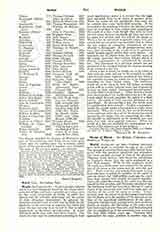
Abraham Woodhead
B. at Almonbury, Yorkshire, about March, 1609; died at Hoxton, Middlesex, May 4, 1678

Woodhead, ABRAHAM, b. at Almonbury, Yorkshire, about March, 1609; died at Hoxton, Middlesex, May 4, 1678. This voluminous controversial writer was educated at University College, Oxford, entering in 1624, becoming fellow in 1633, and proctor in 1641. While travelling abroad in 1645 he began to think of joining the Catholic Church, but the exact date of his reception is not known. Ejected from his fellowship in 1648, he became tutor to the young Duke of Buckingham, and then lived with the Earl of Essex and other friends till 1654, when he and some other Catholics purchased a house at Hoxton, where they lived a community life, occupying themselves in devotion and study. In 1660 his fellowship was restored, but after a brief residence in Oxford he returned to the more congenial surroundings at Hoxton, where, assured of the income of his fellowship, he lived till his death occupied in literary labors. His friend Hearne the antiquarian declared him to be “one of the greatest men that ever this nation produced”. Among his numerous books the chief original works were “Ancient Church Government”, 5 parts (1662-85); “Guide in Controversies” (1667)7 and a long appendix thereto (1675); four theological works against Stillingfleet; “Life of Christ” (1685); “Motives to Holy Living” (1688); “Discourse on the Eucharist” (1688); “On Images and Idolatry” (1689), and an incomplete treatise on Antichrist (1689). He also translated the “Life of St. Teresa” and St. Augustine’s “Confessions”, and paraphrased the Epistles of St. Paul (with Walker and Allestree) and the Apocalypse. A large collection of his unpublished MSS., with autograph letters and writings relating to him, which was formed in the eighteenth century by Cuthbert Constable, is now in the possession of Sir Thomas Brooke, F.S.A., of Armitage Bridge, Huddersfield.
EDWIN BURTON

